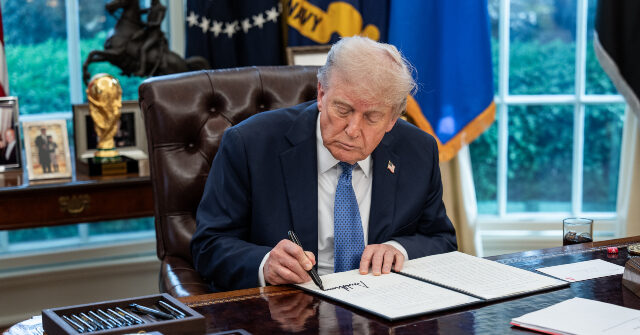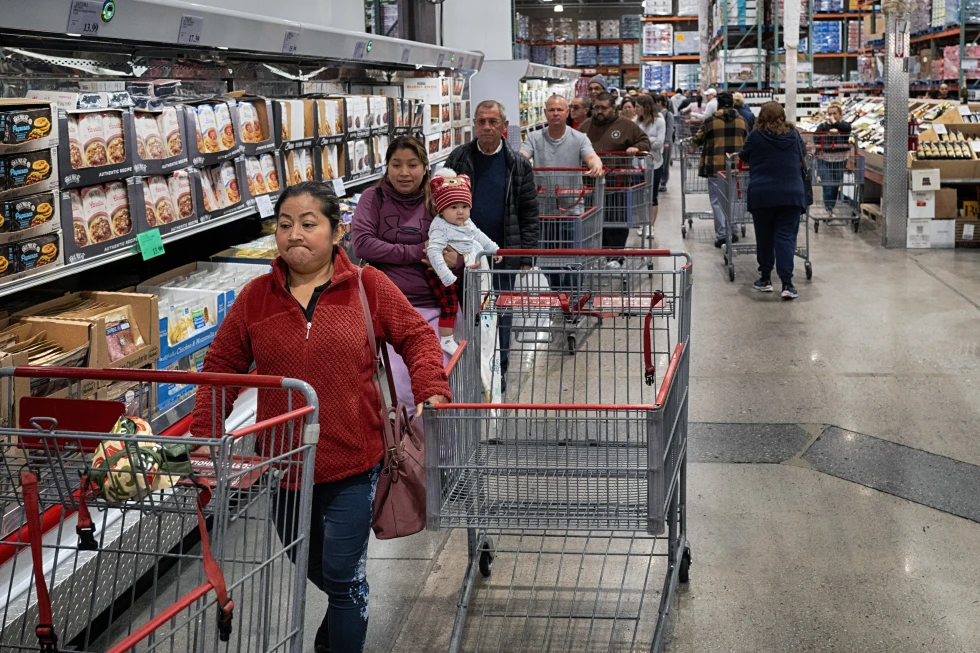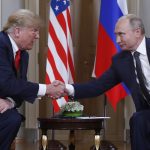Tariff threats from Washington and possible large-scale government job cuts have made people feel less confident and might be slowing down what has mostly been a strong economy.
New data released on Friday showed that people reduced their spending by the biggest amount since February 2021, even though their incomes went up. One good sign was that inflation cooled, but President Donald Trump’s plans to raise import taxes on Canada, Mexico, and China — the country’s top trading partners — are expected to increase prices, according to economists. Some businesses have already announced plans to raise prices in response.
In January, Americans reduced their spending by 0.2% from the previous month, according to the Commerce Department. Cold weather may have played a role, but the drop could also reflect growing caution as economic uncertainty rises.
Stephen Stanley, chief U.S. economist at Santander, said in an email that unpredictable news from Washington is likely making businesses more hesitant and may be affecting consumers as well.
The drop in spending, along with a jump in imports in January as companies rushed to avoid possible tariffs, led the Federal Reserve Bank of Atlanta to predict a 1.5% decline in economic growth for the first quarter of the year. This is a big drop from the 2.3% growth seen at the end of last year.
Most economists still think the economy will grow in the first quarter, but at a slower rate. Stanley reduced his estimate from about 2.25% to just 1.25%.
AP Washington correspondent Sagar Meghani reported on the sharp drop in January consumer spending.
Inflation fell to 2.5% in January compared to a year earlier, down slightly from 2.6% in December. When excluding food and energy prices, which often change a lot, core inflation dropped to 2.6% — the lowest since June — from 2.9%.
Economists said inflation will likely continue falling, but new tariffs could stop that progress. On Thursday, Trump announced a 25% tariff on imports from Canada and Mexico, except for Canadian oil, which would face a 10% tariff. He also said he wants to double the current 10% tariff on Chinese imports to 20%.
Trump is also pushing for major cuts to government jobs, which could lead to hundreds of thousands of layoffs and possibly raise the unemployment rate.
Randy Carr, CEO of World Emblem, said the tariffs, if applied, would force him to raise prices and cut jobs. His company makes patches, labels, and badges for businesses, schools, and law enforcement. While he has factories in Georgia and California, about 60% of his products are made in Mexico. If a 25% tariff is added, he expects to raise prices by 5% to 10% and cut some of the 500 U.S. jobs at his company to help cover the added costs.
Carr said he would also cancel $9 million worth of planned investments in artificial intelligence and online shopping tools.
“It’s so annoying,” he said. “Right now you have this volatility, and so you really can’t plan anything. You just got to wait until we get a final verdict from the administration. It’s definitely not punishing Mexico, it’s punishing us.”

The Federal Reserve said in January that it would hold its key short-term interest rate steady at 4.3% to slow borrowing and spending and try to bring inflation down to its 2% target. That interest rate affects mortgages, car loans, and credit card rates.
The Fed prefers Friday’s measure of inflation over the better-known consumer price index, which rose to 3% in January. The Fed’s preferred inflation measure calculates prices a bit differently, putting less importance on things like housing and used cars.
Inflation spiked in 2022 to a 40-year high, helping Trump win the presidency and prompting the Fed to raise interest rates quickly to cool prices. Inflation has since dropped from a high of 7.2%, and some economists think it could fall closer to 2% in the coming months — unless tariffs get in the way.
Stanley said inflation data could be pushed higher just when the Fed might otherwise be ready to say it had succeeded.
One encouraging detail in Friday’s report was that incomes rose 0.9% in January from December, helped by a big annual cost-of-living increase for Social Security recipients.
Still, people didn’t spend more. In fact, they spent less, especially on cars, where purchases dropped sharply. Economists said some shoppers might be trying to cut back after spending a lot during the holiday season. In December, credit card debt rose sharply.
A key concern now is whether tariffs will raise prices, slow growth, or possibly do both.
Jeffrey Schmid, president of the Federal Reserve’s Kansas City branch, said on Thursday that he’s become “more cautious” about inflation, partly because Americans are expecting prices to go up.
He also said businesses in his district are worried about uncertainty, and that this could slow growth. Normally, a weaker economy might lead the Fed to lower interest rates. But if inflation remains high, it may leave rates as they are.
Some toy makers were relieved when Trump first announced a 10% tariff on Chinese imports, thinking they could share the cost with retailers. But now that the proposed tariff has jumped to 20%, many say they’ll have to raise prices. About 80% of toys sold in the U.S. are made in China.
Curtis McGill, CFO of the small toy company Hey Buddy Hey Pal, called the situation “a nightmare scenario.”
McGill had just agreed on a price for one of his toys with a big retailer, but he had to cancel the deal after hearing about the new tariffs. He expects to raise prices by 10% during the holiday season.
Walmart, the country’s biggest retailer, last week expressed concern about the health of U.S. consumers. It gave weaker sales predictions than expected for this year, which caused its stock price to fall.
Concerns about tariffs making goods more expensive have caused consumer confidence to drop, wiping out the slight improvements seen after the election.


